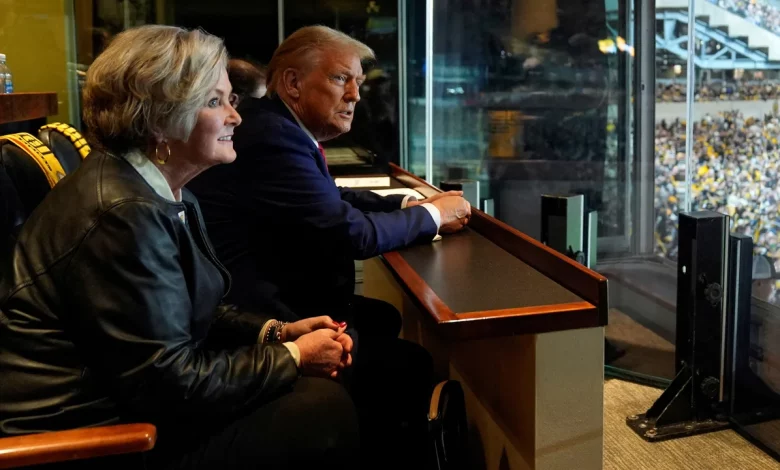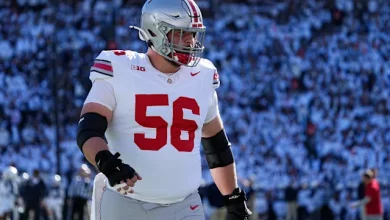Donald Trump will become the first sitting president to attend the NFL’s premier game.

In a historic moment for both American sports and politics, President Donald Trump has announced that he will attend the Super Bowl, making him the first sitting president in history to attend the NFL’s biggest event. This unprecedented move has generated significant media attention and raised questions about the implications of a sitting president being present at such a high-profile sporting event. Super Bowl Sunday, traditionally a day of entertainment, sportsmanship, and celebration for millions of Americans, is about to take on new meaning as the nation’s leader joins the festivities in a public and personal way.
The Significance of the Super Bowl
The Super Bowl is far more than just a championship game; it is an integral part of American culture. Over the decades, the event has become synonymous with American pride, commercialism, and a unique blend of sports and entertainment. Each year, millions of viewers tune in to watch the game itself, while also enjoying the extravagant halftime show and advertisements that have become an intrinsic part of the experience. The Super Bowl has transcended its role as a sports event to become a national spectacle, a celebration that brings together people from all walks of life, regardless of their interest in football.
For most Americans, the Super Bowl is a shared event that bonds families, friends, and even strangers. The game’s influence stretches beyond sports, as the accompanying commercials, celebrity appearances, and the highly anticipated halftime performances have made the Super Bowl one of the most watched television events globally. It is in this context that President Donald Trump’s decision to attend the Super Bowl holds so much weight.
Trump’s Role in the NFL
The relationship between Donald Trump and the NFL has been complex and filled with controversy over the years. Before entering politics, Trump was a well-known businessman, and he had connections to the NFL as the owner of the New Jersey Generals, a team in the now-defunct United States Football League (USFL). Despite the USFL’s eventual failure, Trump maintained an interest in football and its cultural importance in America.
During his presidency, Trump’s relationship with the NFL evolved from distant admiration to active involvement in the broader conversations around the league. His public statements on issues like player protests during the national anthem, the conduct of NFL players, and the general state of the league often grabbed headlines. These comments, particularly his criticism of players kneeling during the national anthem, sparked a national debate about political activism in sports and the role of athletes in social issues. At times, Trump’s opinions about the NFL and its players were at odds with the league’s stance, leading to a more contentious relationship than the one typically enjoyed by sitting presidents.
Despite these differences, Trump’s decision to attend the Super Bowl represents an effort to reconcile his relationship with the NFL, as well as a recognition of the significance of the event. By attending the game, Trump is sending a clear message that, despite his past disagreements with the league, he acknowledges the importance of the Super Bowl as a cultural event and an opportunity to connect with the American people.
A Historical First
The decision to attend the Super Bowl represents a significant break from tradition for sitting U.S. presidents. Historically, presidents have avoided attending major sporting events for a variety of reasons, including concerns about security, the risk of politicizing the event, and the potential distraction from the duties of the office. While presidents have occasionally attended sporting events such as the World Series or NCAA basketball games, none have chosen to participate in the Super Bowl during their time in office.
The absence of presidents from the Super Bowl has traditionally been linked to the event’s status as a cultural touchstone. The Super Bowl is one of the few occasions in American life that transcends politics and brings people from all sides of the political spectrum together. Its appeal is universal, and presidents have historically refrained from attending in order to avoid turning a national celebration of sport into a political statement.
Trump’s decision to break this mold, however, is emblematic of his approach to politics and public life. Throughout his presidency, Trump has often broken with tradition and precedent, favoring bold, unconventional moves that generate media attention and redefine established norms. By attending the Super Bowl, Trump is positioning himself not only as a leader of the nation but also as someone who is willing to embrace popular culture and engage with everyday Americans in a more personal and visible way.
The Political Implications
The decision to attend the Super Bowl is bound to have political implications. As a sitting president, Trump’s every move is scrutinized, and his attendance at the Super Bowl will be no exception. Given the divisiveness of his presidency, Trump’s presence at the Super Bowl could draw both praise and criticism, depending on the political leanings of the observers.
Supporters of Trump may view his decision to attend the Super Bowl as a unifying gesture, a symbol of his commitment to connecting with all Americans, regardless of political affiliation. The Super Bowl has long been an event that brings people together, and for many Trump supporters, his attendance at the game could be seen as a way to underscore his leadership and relate to the American public on a more personal level.
On the other hand, critics of Trump may see his decision to attend as a way to use the Super Bowl for political gain. Given the polarizing nature of his presidency, any appearance at such a high-profile event could be interpreted as an attempt to draw attention away from other issues or distract from ongoing political controversies. Furthermore, Trump’s history of criticism toward NFL players, particularly regarding protests during the national anthem, could lead to negative reactions from those who feel that his presence at the event is inappropriate.
The NFL itself may also find itself walking a fine line. The league has faced its own share of challenges in recent years, with ongoing debates about player protests, concussion protocols, and issues of race and social justice. Trump’s attendance could serve as a reminder of the complicated relationship between the league and politics. The NFL may be faced with the challenge of balancing its desire to maintain its cultural status as an entertainment juggernaut while navigating the political implications of having a sitting president at such a high-profile event.
The Super Bowl Experience in 2025
Super Bowl 2025 is set to be one of the most highly anticipated games in NFL history. With the game drawing near, excitement is already building among fans, athletes, and celebrities alike. The matchup itself promises to be thrilling, with two top-tier teams battling it out for the championship. However, the presence of President Trump at the event will undoubtedly add another layer of intrigue to the spectacle.
For many, Trump’s attendance will mark a historic moment in the Super Bowl’s long history. His presence will undoubtedly draw attention from fans and media, creating a unique atmosphere around the game. Whether or not his attendance influences the game itself remains to be seen, but it is clear that the 2025 Super Bowl will be an event that transcends the field of play.
What This Means for Future Presidents
The decision of Donald Trump to attend the Super Bowl may have long-term implications for future presidents and their relationship with major sporting events. Historically, presidents have been cautious about appearing at large, politically charged events, but Trump’s decision may set a new precedent for sitting presidents who wish to engage with the American people in new and more personal ways.
It is possible that future presidents will follow Trump’s example, recognizing the Super Bowl as an opportunity to connect with a broad, diverse audience. By embracing the cultural significance of the Super Bowl and other major sporting events, future presidents may seek to bridge the gap between politics and popular culture, reaching out to citizens in a way that previous administrations have avoided.
Conclusion
President Donald Trump’s announcement that he will attend the Super Bowl in 2025 is a historic moment for both American sports and politics. As the first sitting president to attend the NFL’s premier game, Trump is breaking tradition and challenging long-standing norms about the relationship between politics and sport. His presence at the Super Bowl will undoubtedly be one of the most talked-about aspects of the event, and it will have significant implications for both his presidency and the future of political engagement in sports.
Regardless of one’s political views, Trump’s attendance at the Super Bowl is a sign of how sports, entertainment, and politics are increasingly intertwined in modern America. Whether as a unifying force or a source of division, the decision to attend the Super Bowl will undoubtedly shape how future presidents engage with American culture and the events that bring the nation together. The 2025 Super Bowl will not just be remembered for the game played on the field, but for the historic moment that saw a sitting president join the millions of fans in attendance.









